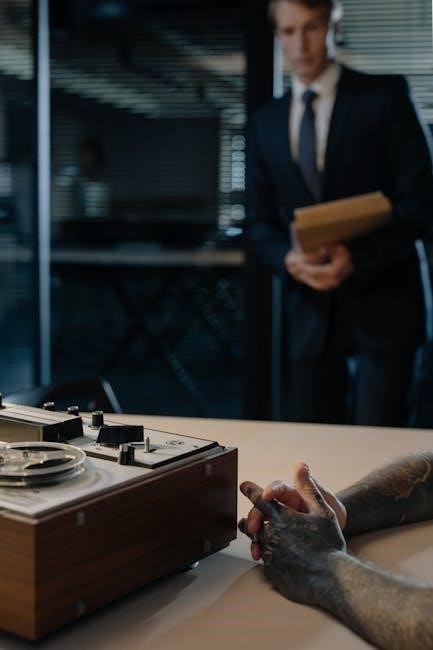fireman interview questions and answers pdf

Preparing for firefighter interviews requires understanding the process‚ types of questions‚ and showcasing your skills and passion for the role․ This guide covers technical‚ behavioral‚ and situational queries‚ helping you structure answers effectively using the STAR method․ Researching departments and practicing responses are crucial for success․ Use PDF guides for in-depth preparation and acing your interview․
Overview of Firefighter Interviews
Firefighter interviews are structured to assess a candidate’s technical knowledge‚ problem-solving skills‚ and personal qualities․ They typically include technical questions about fire suppression systems‚ behavioral queries on teamwork‚ and situational scenarios to evaluate decision-making․ Candidates are often asked about their education‚ experience‚ and motivation for becoming a firefighter․ Preparation is key‚ as interviews may involve written tests‚ oral boards‚ and practical assessments․ Researching the department and practicing answers using the STAR method can significantly improve performance․ Demonstrating confidence‚ professionalism‚ and a clear understanding of the role is essential for success․
Importance of Preparation
Preparation is crucial for firefighter interviews‚ as it demonstrates professionalism and readiness․ Researching common questions and practicing answers using the STAR method ensures confidence․ Understanding the fire department’s values and mission shows genuine interest․ Reviewing technical topics‚ such as fire suppression systems‚ and behavioral scenarios helps you provide structured responses․ Practicing aloud and staying updated on fire safety codes enhances your credibility․ Thorough preparation not only highlights your skills but also showcases your commitment to the role‚ making you a standout candidate in a competitive process․
Key Topics Covered in Firefighter Interviews
Firefighter interviews often cover technical knowledge‚ behavioral traits‚ and situational responses․ Candidates are assessed on their understanding of fire suppression systems‚ tools‚ and safety codes․ Behavioral questions focus on leadership‚ teamwork‚ and problem-solving skills․ Situational scenarios evaluate decision-making in emergencies․ Fire department-specific questions address alignment with the department’s values and mission․ Additionally‚ the STAR method is frequently recommended for structuring responses․ Understanding these topics and practicing answers is crucial for success․ PDF guides provide detailed insights and sample questions to aid preparation effectively․
Common Firefighter Interview Questions
Common questions include “Why do you want to be a firefighter?” and “What are your strengths and weaknesses?” These queries assess your motivation‚ self-awareness‚ and suitability for the role․
Why Do You Want to Be a Firefighter?
This question assesses your motivation and commitment to the role․ Emphasize your desire to serve the community‚ protect lives‚ and make a difference․ Highlight qualities like courage‚ teamwork‚ and problem-solving skills․ Explain how your passion for firefighting aligns with the department’s mission․ Be specific about what drives you‚ whether it’s the adrenaline of emergency response or the satisfaction of helping others․ Prepare examples from your background that demonstrate your readiness for the challenges of this demanding yet rewarding career․ Practice your answer to convey sincerity and professionalism․
What Are Your Greatest Strengths and Weaknesses?
When discussing strengths‚ highlight qualities like physical fitness‚ teamwork‚ and quick decision-making․ For weaknesses‚ address areas like stress management or public speaking‚ but emphasize how you’re improving them․ Be honest and specific‚ showing self-awareness and growth․ For example‚ mention how you’ve taken courses to enhance communication skills or practice mindfulness to handle pressure․ Use the STAR method to frame your answers‚ ensuring they are personal and relevant to firefighting roles․ This demonstrates your ability to reflect and adapt‚ crucial for the demanding nature of the job․
Describe Your Education and Work Experience
Highlight your educational background‚ certifications‚ and relevant work experience․ Emphasize any firefighter-related training‚ such as EMT certification or fire academy completion․ Discuss previous roles that demonstrate teamwork‚ physical stamina‚ and problem-solving skills․ For example‚ mention leadership roles or experiences in high-pressure situations․ Tailor your response to align with the fire department’s values‚ showcasing how your skills and background prepare you for the demands of firefighting․ Be specific‚ using the STAR method to structure your answer clearly and effectively․
How Do You Handle Stressful Situations?
Firefighters often face high-stress environments‚ requiring strong emotional resilience․ Remaining calm under pressure allows for clear decision-making and effective action․ Proper training‚ communication‚ and teamwork are essential for managing stress․ Staying focused on the task at hand‚ relying on experience‚ and prioritizing safety help maintain composure․ After the situation‚ stress management techniques like debriefing or physical activity can aid in recovery․ Demonstrating how you handle stress showcases your ability to perform reliably in critical moments․
Technical Firefighter Interview Questions
Technical questions focus on fire suppression systems‚ types of sprinkler systems‚ and tools used by firefighters․ Understanding fire safety codes and handling hazardous materials are also key topics․
What Are Fire Suppression Systems?
Fire suppression systems are designed to detect and control fires‚ preventing their spread․ They include sprinkler systems‚ which release water upon activation‚ and clean agent systems‚ which use chemicals․ These systems are crucial for protecting lives and property․ Firefighters must understand their operation to respond effectively․ This knowledge is essential for interview questions‚ showcasing a candidate’s technical expertise in fire safety and management․ Understanding activation methods and system types is vital for effective emergency responses․
Types of Fire Sprinkler Systems
Fire sprinkler systems are categorized into different types based on their design and functionality․ The most common types include wet pipe systems‚ which are the most prevalent and reliable‚ and dry pipe systems‚ used in areas prone to freezing temperatures․ Pre-action and deluge systems are specialized for high-risk environments‚ while clean agent systems are designed for sensitive equipment protection․ Understanding these systems is crucial for firefighters‚ as it helps in effectively managing fire suppression and ensuring public safety․ Each type has unique characteristics and applications‚ making them essential components of modern fire safety infrastructure․
What Tools Do Firefighters Commonly Use?
Firefighters rely on various tools to perform their duties safely and effectively․ Common equipment includes Halligan tools‚ fire axes‚ hoses‚ thermal imaging cameras‚ and breathing apparatuses like SCBAs․ These tools help in forcible entry‚ search and rescue‚ and firefighting operations․ Hoses are used to deliver water or foam‚ while thermal cameras aid in navigating smoke-filled areas․ Familiarity with these tools is essential for both performance and safety‚ making them a key topic in firefighter interviews․
Understanding Fire Safety Codes and Regulations
Fire safety codes and regulations are essential for ensuring public safety and preventing fire hazards․ These codes‚ often established by organizations like the National Fire Protection Association (NFPA)‚ outline standards for fire suppression systems‚ building design‚ and emergency procedures; Firefighters must understand these regulations to enforce compliance and respond effectively during emergencies․ Familiarity with codes like NFPA 13 (fire sprinkler systems) and NFPA 72 (fire alarm systems) is critical․ Firefighters play a key role in educating communities and conducting inspections to uphold these standards‚ ensuring a safer environment for everyone․
How to Handle Hazardous Materials Incidents
When handling hazardous materials incidents‚ prioritize safety and follow established protocols․ Assess the situation‚ identify the material‚ and use personal protective equipment (PPE)․ Containment is critical to prevent spread․ Coordinate with the team to evacuate the area and secure the perimeter․ Communicate clearly with dispatch and other responders․ Follow proper decontamination procedures and seek specialized assistance if needed․ Stay calm and adhere to safety guidelines to minimize risks and protect people and the environment effectively․
Behavioral Firefighter Interview Questions
Behavioral questions assess your past actions and decisions‚ revealing how you handle challenges․ Be prepared to describe leadership‚ teamwork‚ and problem-solving experiences‚ using the STAR method to structure clear‚ concise answers․
Describe a Time When You Demonstrated Leadership
During a group project‚ I took charge when our team lacked direction․ I coordinated tasks‚ ensured everyone’s input was valued‚ and maintained focus on the goal․ When conflicts arose‚ I mediated discussions‚ leading us to a successful outcome․ This experience taught me the importance of clear communication and empathy in leadership․ By staying calm and decisive‚ I guided the team effectively‚ demonstrating my ability to lead under pressure and foster collaboration․
How Do You Approach Problem-Solving in High-Pressure Situations?
In high-pressure situations‚ firefighters must maintain composure and quickly assess the scenario․ They prioritize actions based on safety and urgency‚ making logical decisions guided by experience and training․ Effective communication with the team ensures coordinated efforts․ Employing structured problem-solving techniques‚ such as identifying the root cause and evaluating options‚ allows for swift and appropriate responses․ Training and past experiences provide the foundation for making informed decisions‚ ensuring the safety of both the team and those in danger․ Clear communication and teamwork are essential for executing the plan efficiently in high-stress environments․
Can You Provide an Example of Teamwork in Your Previous Roles?
In my previous role as a volunteer firefighter‚ I collaborated with a team during a community fire safety event․ We worked together to educate residents on fire prevention and escape plans․ I contributed by organizing materials and coordinating with local schools․ The team’s collective effort resulted in a 30% increase in safety plan submissions․ This experience highlighted the importance of communication‚ delegation‚ and adaptability in achieving a common goal․ It demonstrated how teamwork can enhance community impact and prepared me for the collaborative nature of firefighting․
How Do You Ensure Effective Communication in a Team?
Effective communication in a team is crucial for success‚ especially in high-stress roles like firefighting․ Always maintain clarity and precision when conveying information‚ ensuring everyone understands their roles and responsibilities․ Active listening is key—pay attention to others’ input and ask questions to confirm understanding․ Regular updates and open dialogue help prevent misunderstandings․ Encourage a collaborative environment where team members feel comfortable sharing ideas․ Use tools like the STAR method to structure your responses clearly․ Practicing these strategies builds trust and ensures seamless coordination during critical situations․
Describe a Situation Where You Had to Adapt Quickly
In a training simulation‚ I encountered an unexpected change in conditions during a fire scenario․ The smoke became thicker than anticipated‚ reducing visibility․ I quickly assessed the situation‚ communicated with my team‚ and adjusted our strategy to prioritize safety while maintaining our mission․ We adapted our approach by using thermal imaging cameras and coordinating movements more precisely․ This experience taught me the importance of staying calm‚ thinking critically‚ and communicating effectively in dynamic emergency situations․

Situational Firefighter Interview Questions
Situational questions assess your decision-making in emergencies․ Examples include responding to sudden calls‚ handling panicked crowds‚ and managing equipment failures․ Use the STAR method to structure answers․
How Would You Respond to a Sudden Emergency Call?
When responding to a sudden emergency call‚ prioritize safety and efficiency․ Stay calm‚ quickly assess the situation‚ and follow established protocols․ Communicate clearly with your team‚ ensuring everyone understands their role; Utilize available resources and equipment effectively‚ maintaining constant situational awareness․ Always prioritize the safety of civilians and colleagues‚ adapting your response as needed․ Effective communication and swift decision-making are critical in such high-pressure scenarios․ Demonstrating composure and professionalism ensures a coordinated and successful response to the emergency․
Describe a Difficult Decision You’ve Made in a Crisis
In a high-pressure situation‚ such as a residential fire with trapped occupants‚ I had to decide whether to prioritize rescuing the individuals or salvaging their belongings․ I quickly assessed the risks and chose to focus on evacuating the family‚ ensuring their safety․ My team and I executed the rescue swiftly‚ and everyone was brought to safety without serious injury․ This experience taught me the importance of prioritizing human life over material goods in critical situations․
Key points:
- Stay calm and assess the situation quickly․
- Prioritize safety and human life․
- Communicate clearly with your team․
- Learn from the experience to improve future decisions․
How Would You Handle a Situation Where the Public is in Panic?
Staying calm and composed is essential․ I would assess the situation quickly‚ ensure my team’s safety‚ and communicate clearly with the public․ Providing reassurance and clear instructions helps reduce panic․ Guiding people to a safe location while maintaining order is crucial․ I would also coordinate with other responders to address the emergency effectively․ Effective communication and a calm demeanor are key to de-escalating the situation and ensuring everyone’s safety․ Prioritizing the well-being of all individuals involved remains my primary focus․ This approach ensures a structured and compassionate response to panicked scenarios․
What Would You Do If Your Firefighting Equipment Failed?
If your firefighting equipment failed‚ remain calm and quickly assess the situation․ Notify your team leader and follow established protocols․ Use backup tools or alternative methods to ensure safety․ Prioritize protecting yourself and others while awaiting assistance․ Effective communication is key to resolving the issue efficiently․ Always follow safety guidelines and stay prepared for such scenarios․ This demonstrates problem-solving skills and adherence to training․ Proper preparation and knowledge of procedures are essential for handling equipment failures safely and professionally․

Fire Department-Specific Interview Questions
Prepare to discuss why you chose this department‚ its mission‚ and your alignment with its values․ Research their unique challenges and culture to tailor your answers․
Why Do You Want to Work for This Fire Department?
This question assesses your alignment with the department’s values and mission․ Highlight specific reasons‚ such as the department’s reputation‚ community commitment‚ or innovative approaches․ Emphasize how your skills and values match their objectives․ Mention any unique programs or initiatives the department is known for‚ showing you’ve done your research․ Focus on your desire to contribute to public safety and serve the community effectively․ Demonstrating genuine interest and knowledge will make your answer stand out and show your enthusiasm for the role․
What Do You Know About Our Department’s Values and Mission?
It’s essential to demonstrate your understanding of the fire department’s core values‚ such as bravery‚ integrity‚ and community service․ Highlight their mission to protect lives‚ property‚ and the environment․ Discuss how their commitment to public safety aligns with your personal and professional goals․ Mention specific initiatives‚ like fire prevention programs or community outreach‚ showing you’ve researched their priorities․ Emphasize how your skills and values match their organizational culture‚ proving you’re a motivated and informed candidate ready to contribute effectively․
What Questions Do You Have for the Interview Panel?
Asking thoughtful questions during your firefighter interview demonstrates engagement and preparation․ Inquire about the department’s culture‚ common challenges‚ and opportunities for professional growth․ Avoid questions about salary or benefits‚ as these are typically addressed later․ Instead‚ focus on understanding the team dynamics‚ training programs‚ and community involvement․ Examples include: “What does a typical day look like for a firefighter in this department?” or “How does the department support ongoing training and development?” Prepare a list of questions to show your genuine interest in the role and the department’s mission․

Preparing for Your Firefighter Interview
To excel in your firefighter interview‚ research the department‚ practice answers using the STAR method‚ and review PDF guides for common questions and effective preparation․
Researching the Fire Department
Researching the fire department is essential to understand their mission‚ values‚ and challenges․ Review their website to learn about their history‚ community involvement‚ and recent initiatives․ Familiarize yourself with their equipment‚ training methods‚ and response protocols․ Understanding their culture and expectations helps tailor your answers to align with their goals․ Stay updated on local news about the department to discuss current events confidently․ This preparation demonstrates your genuine interest and commitment‚ making your application stand out during the interview process․
Practicing Your Answers
Practicing your answers is essential to acing firefighter interviews․ Use flashcards or mock interviews to rehearse responses to common questions‚ ensuring clarity and confidence․ Focus on specific examples from your experience‚ such as teamwork or problem-solving scenarios․ Record yourself to identify areas for improvement and refine your delivery․ Mock interviews with peers or mentors can simulate real conditions‚ helping you adapt to unexpected queries․ Be concise‚ avoid jargon‚ and highlight your strengths․ The more you practice‚ the more natural and polished your answers will become‚ boosting your chances of success during the actual interview․
Using the STAR Method to Structure Your Responses
The STAR (Situation‚ Task‚ Action‚ Result) method is a powerful tool for structuring clear‚ concise answers․ Begin by describing the situation or context‚ then outline the task or challenge you faced․ Next‚ detail the actions you took to address it‚ and conclude with the result or outcome․ This approach ensures your responses are organized‚ highlighting your problem-solving skills and decision-making abilities․ Practicing with the STAR method helps you deliver confident‚ impactful answers during firefighter interviews․
Staying Confident and Professional
Confidence and professionalism are key during firefighter interviews․ Prepare thoroughly by researching the department and practicing answers․ Dress appropriately‚ maintain eye contact‚ and speak clearly․ Show enthusiasm and genuine interest in the role․ Confidence comes from knowing your strengths and being ready to discuss them․ Avoid arrogance and stay humble․ Professionalism involves respecting the panel‚ listening actively‚ and providing thoughtful responses․ Demonstrating these traits will leave a positive impression and highlight your suitability for the role․ Remember‚ confidence grows with preparation and practice․
Mastering firefighter interviews requires preparation‚ confidence‚ and showcasing your passion for the role․ Use PDF guides to refine your answers and stay professional throughout the process․
Final Tips for Acing Your Firefighter Interview
Confidence and professionalism are key during your firefighter interview․ Thoroughly research the department‚ practice answers using the STAR method‚ and stay calm under pressure․ Highlight your strengths‚ provide specific examples‚ and demonstrate genuine passion for firefighting․ Show enthusiasm for the department’s mission and values․ Prepare thoughtful questions for the panel to showcase your interest․ Avoid generic responses and ensure your answers align with the role’s demands․ Lastly‚ maintain a positive attitude and reflect your commitment to serving the community․

Additional Resources
Recommended PDF guides provide comprehensive preparation for firefighter interviews‚ offering sample questions‚ answers‚ and tips․ They cover technical topics like fire suppression systems and interview strategies‚ ensuring readiness․
Recommended PDF Guides for Firefighter Interviews
PDF guides are invaluable resources for preparing for firefighter interviews․ They often include lists of common questions‚ sample answers‚ and tips for structuring responses․ Popular guides cover topics like technical firefighting knowledge‚ behavioral scenarios‚ and situational questions; Many PDFs also provide insights into the STAR method for answering questions effectively․ Additionally‚ they may include practice questions and advice on how to research the fire department beforehand․ These guides are essential for candidates aiming to standout in competitive interviews and demonstrate their readiness for the role․